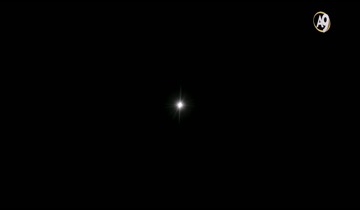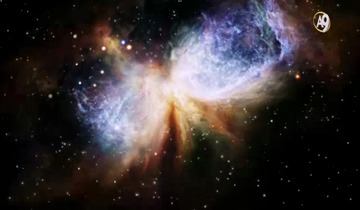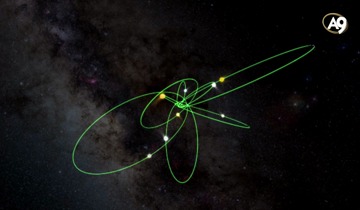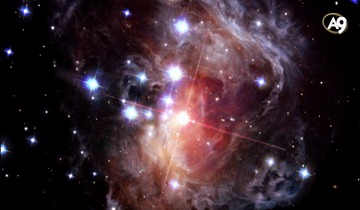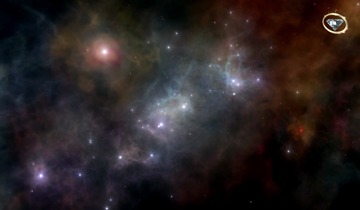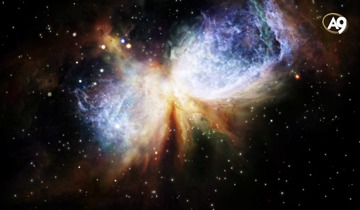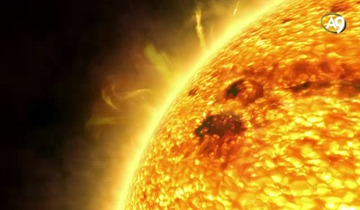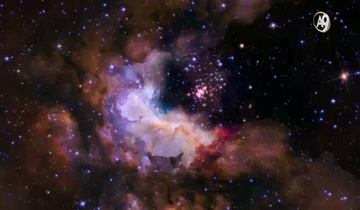The universe....
Endless… wonderful and incredibly exciting....
Planets many times larger than the Earth, gigantic black holes whose structures defy the known laws of physics, the nuclear reactor of the Sun, which is also the source of our life giving energy, and billions of cities of stars that make up galaxies.....
The universe is truly unimaginably large and is full of wonders waiting to be discovered… It is so vast that we cannot even properly determine the boundaries of the universe.
According to the latest astrophysical research, the limits of the observable universe are at least 93 billion light years in diameter. This is a number far beyond our comprehension…
Just consider that light travels at a speed of 300,000 kilometers a second, a speed that would allow one photon of light to travel around the world seven times in just a second.
93 billion light years…. While we are still not able to comprehend the meaning of this number, the situation is even further complicated by another finding: every second, the universe is expanding at an alarming rate, and this speed is gradually increasing.
In this episode of Orbit, we will examine the expansion of the magnificent universe, and our world’s place within it. We will also look at the beginning of it all – the Big Bang, which is the moment of birth of our universe, and some of the amazing new discoveries of astronomy.
Scientific information is important for us… Every new piece of information about the universe we obtain allows us to widen our horizons that little bit more. By God’s grace, as we expand our horizons and increase our knowledge; we grow more in awe of our Lord’s infinite wisdom, glory and power.
Let’s begin this episode of ‘Orbit’…
OUR PLACE IN THE UNIVERSE
If our minds are unable to really grasp the enormous scale of the universe, how do we know our place in it?
We can use the size of the world as a ‘benchmark’ to help us understand the true magnitude of the universe.
For example, a point of reference might be that the diameter of the Sun is 103 times that of the Earth. Let’s explain this using a comparison… If we take the size of the Earth to be that of a marble, then the Sun becomes a sphere twice the size of a soccer ball. What is really striking here is the distance between them. Following the above model, our Earth, the size of a marble, is 280 meters away from the Sun the size of two footballs. If we apply this to our Solar System, then we would need to place the planets kilometers away.
You may conclude from this simulation that the Solar System is truly huge. However, compared to the size of the Milky Way Galaxy in which it lies, the size of the Solar System is rather modest. This is because the Milky Way Galaxy contains around 250 billion stars, many of which are even larger than the Sun.
The Milky Way is such a massive collection of stars that if you tried to cross it with a jet plane, it would take you 100 billion years to go from one end to the other… However, what is truly incredible is that the Milky Way galaxy is generally considered a “small” place within space. There are other galaxies in space, in fact, it is estimated that there are somewhere between 200 and 300 billion of them… and as more are continuously being discovered the actual number remains unknown.
THE TINY EARTH IN THE UNIVERSE...
Our world was created as a very special place for life within a universe so vast that we cannot reach its limits. For us, the planet’s thousands of metres high mountains, the wide plains and the enormous oceans make the world seem huge… But in comparison to the vast dimensions of space, it covers an almost negligible area.
When you consider the width of the universe and the size of celestrial bodies, then the size of the world is as tiny as a grain of sand in my hand.
Our goal is to envision a better view of our small position in the universe than the picture of a Pale Blue Dot that you now see on your screen.
Yes… As you have guessed, that little blurred blue dot in the photograph shows our world all alone in the vastness of space..
The photograph was taken by the Voyager 1 probe from the staggering distance of 6.4 billion km away from the Earth…
The astronomist Carl Sagan made the following comments in his speech on this impressive photograph:
Consider again that dot. That’s here. That’s home. That’s us. On it, everyone you love, everyone you know, everyone you ever heard of, every human being who ever was, lived out their lives.
The Earth is a very small stage in a vast cosmic arena. Think of the rivers of blood spilled by all those generals and emperors so that in glory and triumph they could become the momentary masters of a fraction of a dot.
Our posturing, our imagined self-importance, the delusion that we have some privileged position in the universe, are challenged by this point of pale light. Our planet is a lonely speck in the great enveloping cosmic dark.
We can better understand our position in the universe due to advances in science and we realize how we are mistaken to regard ourselves to be so great.
HUBBLE ULTRA DEEP FIELD PHOTOGRAPH
In 2004, we peered further back in time than ever before, and captured the light from the most distant galaxies in the universe.
There is another important image that helps us better understand the size of the universe. A Deep Space Photograph… Let’s look at it together.
The image you can see on the screen was taken by the Hubble Space Telescope over a period of 11 days. The lens of this famous telescope was focused on Orion at a very small point of space just below the Hunter Constellation. The image taken by the telescope has become one of the most talked about images of the skies in modern times.
Every tiny point of light in the image called the Hubble Ultra Deep Field is not a star. In fact, it’s a galaxy that contains hundreds of billions of stars. In effect, it’s a portrait of around 10,000 galaxies.
The most distant galaxies in that image are over 13 billion light years away. The Hubble telescope allows us to look back at almost the beginning of time itself, and provides important clues from deep space as to how the universe began.
Providing just the few examples we have seen of the glorious celestial bodies and wonders of the universe are adequate to show the uniqueness of God’s artistry in His creation. God invites people to contemplate on the creation of the heavens in Surat an-Naziat in the Qur’an:
I seek refuge in God from the accursed satan:
Are you stronger in structure or is heaven? (God) He built it. He raised its vault high and made it level. (Surat an-Naziat, 27-28)
The art of God’s creation of the heavens is very great and magnificent…
As mentioned earlier, the universe is so overwhelmingly large that even comprehending the meaning of numbers used to describe it such as billions of light years is difficult…
Yet, there is one truth that we all know of, the entirety of what we have mentioned above did not exist 13.8 billion years ago… Matter was not in existence… Even time and space were not present…
Then, the universe and everything inside of it came into existence all of a sudden, meaning that all were created…
THE BIG BANG
All of the research performed during the last 100 years has shown that the universe is expanding and by tracing it back in time we can see that it began from a single point. The detailed calculations performed by scientists show that it is necessary for all of the material in the universe to have been contained in this “single point”, which would have “zero volume” but “infinite mass”. Something coming into existence from nothing is called Creation.
This first moment when the universe was created is called the "Big Bang".
Scientific research performed on the delicate balance of the Big Bang shows that it is far from being a haphazard explosion.
All of the other explosions that we are aware of destroy an existing order; yet the Big Bang has produced an amazing order in the universe from zero mass, or nothingness.
Let us now return to the beginning of the universe 13.8 billion years ago and provide an answer to the question: ‘What happened at that crucial moment when everything came into existence from nothing?’ through scientific enquiry. Let’s watch…
The Big Bang was first proposed in the 1920s as a theory which showed that the universe had a beginning by the Russian cosmologist and mathematician, Alexander Friedmann, and the Belgian physicist Georges Lemaître. The theory is widely accepted by scientists, especially physicists, due to the extremely detailed evidence provided.
Infinite mass, zero volume… In short, nothingness… And then suddenly a moment of presence….
Modern science still cannot explain what happened in the first moment of creation: 10 to the power -43 seconds long. This represents a very short amount of time.
0.0000000000000000000000000000000000000000001 of a second.
10 TO THE POWER -43, or zero point, 42 zeros and a one…
This period of 10 to the -43 seconds is known as Planck Time. This period, named after the German scientist Max Planck, is so short that a special term is required to express it.
What we know according to scientific evidence is as follows:
Stars, galaxies and the building blocks of our lives… The calcium in our bones and the iron in our blood; as well as the other elements in our bodies such as nitrogen, carbon and hydrogen. The atoms required for the air that we breathe and the water that we drink…Everything…
All have come into existence with the moment of Creation called the Big Bang.
The basis of everything we see is atoms and molecules. Scientists have so far discovered 118 elements, and of these, 92 occur naturally.
When we consider the complexity of our surroundings, this is absolutely astounding.
And at the same time we know that beyond the Earth, everything we see in the universe is made of the same 92 elements.
The steel, rubber and glass in a car are made up of a number of different materials. If we go deeper, we see that those materials are made of combinations of various elements such as iron, silicon, crome and carbon. Every atom of the car was created billions of years ago with the formation of the universe.
The atoms of every single element came into existence during the first minutes following the Big Bang: the raw materials of the technological gadgets we are using this moment, the parts that make up our buildings, the leaves of every tree, the centre of the Earth, the oceans and people’s bodies.
For example, the water we drink… it’s very old… The hydrogen atoms here were formed following the Big Bang in an environment of unimaginably high temperatures. In other words, the hydrogen atoms in this water were created 13.8 billion years ago....
Now let’s look at the evidence for the Big Bang that has led it to become accepted by the global scientific community.
PROOFS OF THE BIG BANG
1-EXPANSION OF THE UNIVERSE
In 1929, in the California Mount Wilson observatory, an American astronomer by the name of Edwin Hubble made one of the greatest discoveries in the history of astronomy. While he observed the stars with a giant telescope, he found out that the light from them was shifted to the red end of the spectrum and that this shift was more pronounced the further a star was from the Earth.
This discovery had an electrifying effect in the world of science, because according to the recognized rules of physics, the spectra of light beams traveling towards the point of observation tend towards violet while the spectra of the light beams moving away from the point of observation tend towards red.
During Hubble's observations, the light from stars was discovered to tend towards red. This meant that they were constantly moving away from us.
Before long, Hubble made another important discovery: The stars and the galaxies were not only moving away from us, they were also moving away from each other. Only one conclusion could be reached from a universe where everything is moving away from each other: the universe is constantly “expanding”.
While science discovered the expansion of the universe in the 1920s, this truth was announced by the Qur’an 1,400 years earlier.
As for heaven – We built it with great power and gave it its vast expanse. (Surat adh-Dhariyat, 47)
Contrary to what materialists assume, the universe did not emerge because of some coincidences in matter, but it came into existence with God’s creation and definitely, the most accurate source of information on the origins of the universe is the word of God.
2- FURTHER PROOF FOR THE BIG BANG:
COSMIC BACKGROUND RADIATION
1% of the static electricity found on your television comes from Cosmic Microwave Background Radiation left over from the Big Bang of 13.8 billion years ago.
How can that be? Let’s find out….
In 1948, George Gamov, made a new proposal concerning the Big Bang. According to Gamov, if the universe was formed by the Big Bang, then there must be radiation left over from this explosion. What’s more, this radiation must be uniform throughout the universe. It wasn’t long until proof of the “necessary existence” of this radiation was found.
In 1965, two researchers named Arno Penzias and Robert Wilson discovered these waves of radiation; they called it "Cosmic Background Radiation", and discovered that it had no particular source but was spread all over the universe. It was a remnant of the first stages of the Big Bang, and was a wave of heat that had spread evenly to everywhere in the universe. Penzias and Wilson, won the Nobel Prize for their discovery.
In 1989, the National Aeronautics and Space Administration (NASA), launched the COBE satellite to study Cosmic Background Radiation. The advanced sensors on this satellite took only eight minutes to confirm the findings of Penzias and Wilson. COBE had discovered proof of the Big Bang as the beginning of the universe.
The greatest astronomical discovery of all time, the Big Bang theory has been decisively proven. The COBE 2 satellite, which was launched following COBE, only further confirmed the calculations regarding the Big Bang that had already been made.
3- A PICTURE OF THE BIG BANG
Whichever direction we look in space, we can detect light that has been travelling to us from the beginning of the universe, nearly 13.8 billion years ago. However, while the radiation mentioned earlier cannot be seen by the human eye, it can easily be detected by radio telescopes.
On the screen you can see a map (WMAP) showing the radiation in the universe from the Big Bang when the universe was only 380,000 years old.
The image taken by the European Space Agency’s Plank satellite of the traces of this cosmic radiation was obtained after 16 years of hard work... It shows us the remaining echoes of the birth of the universe.
The initial findings of the Planck mission showed us clusters of distant galaxies that had never been seen before and radiation that still exists after the Big Bang, thus unearthing further clues as to how the universe began.
4- PROPORTION OF HYDROGEN TO HELIUM
Another further item of proof for the Big Bang is the amount of hydrogen gas compared to the amount of helium gas in space. It is understood from recent measurements that the proportion of hydrogen to helium gas in the universe corresponds to the theoretical amount that has been calculated to have remained after the Big Bang. If the universe had had no beginning and had therefore been in existence forever, the hydrogen within it would have completely burned up and have been converted into helium.
What do the Scientists Say?
All of this strong evidence has led to firm acceptance of the Big Bang theory by the scientific community. It is now been concluded by science that the universe began and was formed by the Big Bang.
Even materialist scientists who have objected to the Big Bang theory have had to admit that the universe was created in a moment from nothing.
Perhaps the most important of these is the famous physicist Sir Fred Hoyle.
Hoyle has said the following about the implications of the Big Bang:
- “The big bang theory holds that the universe began with a single explosion. Yet, an explosion merely throws matter apart, while the big bang has mysteriously produced the opposite effect - with matter clumping together in the form of galaxies.”
Another intricate feature of the order in the Big Bang is the speed of the explosion. Paul Davies, a renowned professor of theoretical physics, stated that
the pace of expansion after the Big Bang is incredibly fine-tuned and he reached the conclusion that this phenomenon could have only been precisely calculated:
- “Careful measurement puts the rate of expansion very close to a critical value at which the universe will just escape its own gravity and expand forever. A little slower and the cosmos would collapse, a little faster and the cosmic material would have long ago completely dispersed.”
- If the explosion after the Big Bang had been even a little faster, then the cosmic material would have long ago completely dispersed.
- If the expansion rate had differed from its actual value by more than 10 to the -18 (one quintillionth of a second) then there would have been no universe.
-If the density of the universe was a little bit more, in that case, the universe would not be expanding, but contracting, ultimately dimishing to a single point.
-If the initial density had been a little bit less, then the universe would rapidly be expanding, but in this case, atomic particles would not be attracting each other and no stars and no galaxies would ever have formed.
CONCLUSION
The perfect systems we can observe in the universe, the stars, the Earth, the people living on the surface of the Earth, trees, animals, flowers, and all other life… All of this could never have been formed following any type of random explosion with atoms coming together on their own. Everywhere we look we see proofs of our Lord’s Presence and His superior power.
The Quran tells us how the universe came out of nothing:
He is the Originator of the heavens and the earth... (Surat al-Anam, 101)
Matter and time have been brought into existence by the Creator Who is independent of all these concepts and has infinite power. The Creator is God, the Lord of the heavens and the earth.
At a time when humanity had only limited knowledge about the universe 14 centuries ago, the Qur’an gave this information about the universe just in line with the Big Bang theory that it came into being from a minute entity that expanded after being separated.
Do those who are unbelievers not see that the heavens and the earth were sewn together and then We unstitched them and that We made from water every living thing? So will they not have faith? (Surat al-Anbiya, 30)
The original word "ratq", which is translated as "joined together" in the verse means "anything close, solid, impervious, united together in a solid mass". That is, it is used for two different pieces that form an entity. And one of them breaks through the other and makes its way out. Indeed, when we are reminded of the first moment of the Big Bang, we see that the point called the cosmic egg contained all the matter in the universe. Everything, "the heavens and the earth" that were not yet created were contained in this spot in a state of "ratq": Afterwards, this cosmic egg exploded, causing its matter to "fataqa" separating one from the other, and in the process created the structure of the whole universe.
Have a look around you, and you will see that all is in a state of perfect peace, stability and perfection. This is because everything on Earth is not there by chance. Nothing is out of control or has developed unconsciously.
Everything is connected with a wonderfully proportioned and remarkable order because it all belongs to Our Lord, Who created a magnificent and miraculous artistry out of one explosion.
Allah informs in the Quran:
I seek refuge in God from the accursed satan:
To Him is due the primal origin of the heavens and the earth (Enam 101)
That brings us to the end of this episode of Orbit.
Goodbye until next time.
Goodbye



